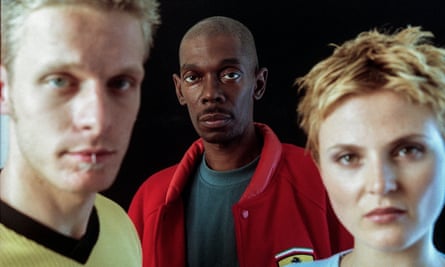Of all the artists who commanded the stage as dance music became big business in the 1990s, Maxi Jazz was in a class of his own. It wasn’t just that the Faithless frontman was an imposing vocalist: his sonorous tone and steady enunciation made that a given. While the group’s first two albums, Reverence and Sunday 8PM, delivered award nominations and a parade of Top 20 singles, it was on stage where Faithless minted their reputation as an elite-level act.
Born Maxwell Fraser in 1957, Maxi Jazz – as he had become known since stints on pirate radio in the mid-1980s – was nearly 40 years old by the time Faithless formed in 1995. The practising Buddhist’s air of pacific wisdom positioned him as a spiritual counter to the spangled masses who came to bear witness as the band’s popularity soared. The energy of an entire arena would flow through Fraser, this calm eye of a rave storm.
In terms of magnetisim, perhaps only the Prodigy’s Keith Flint and Maxim could compare. Yet Fraser flew solo with Faithless’s other core members, Sister Bliss and Rollo respectively hidden behind a bank of synthesisers or glued to a bass guitar. By the turn of the 21st century, his gift for unlocking the mood of a crowd had converted the band into one of Britain’s largest acts – dance or otherwise.
Aesthetically, Faithless drew on the stark contrast between the icy Sister Bliss, typically decked out in haute rave-goth attire, and Maxi Jazz whose sinewy frame was often adorned only by an open jacket. Their early promos made hay out of monochrome imagery: the spectacle of Fraser stalking the docklands or brutalist estates in a cash-stuffed pinstriped suit were masterclasses in how to translate the crackle and thrill of dance music to the screen without rotely reaching for the lasers.
Although Faithless’s singles typically scaled the pinging heights of progressive trance, their albums were balanced out by more earthbound, ruminative fare. Fraser’s cool aura and conscious outlook was informed by golden age hip-hop acts like KRS-One, A Tribe Called Quest and the Jungle Brothers, as well as his upbringing by Jamaican parents in Brixton and Croydon.
This might explain how the 1998 hit God Is a DJ, a slogan that could be inscribed on fridge magnets, sat shoulder-to-shoulder in the Faithless catalogue with tracks concerning displacement, divorce and despair. Fraser’s vocal opposition to conflict – which spiked during the invasion of Iraq on 2004’s searing Mass Destruction – courted the fandom of Michael Stipe and Dave Grohl, as well as Glastonbury’s Michael Eavis, who booked the group to play the Pyramid stage on two occasions.
While Faithless’s biggest and best hits would provoke a Richter-scale crowd response, they also preached patience: God Is a DJ ran to eight minutes; 1995 debut single Salva Mea stretched to 11. Insomnia was a double-Platinum feat of logic-defiance that devoted nearly two-thirds of its runtime (nine minutes for the original Monster Mix, three and a half for the radio edit) to stacking tension before the unmistakable pizzicato synth riff finally hammers in.
Radio programmers who cited Insomnia’s lack of chorus as reason to withhold it from the airwaves could hardly have been more wrong. After a season in Ibiza when Pete Tong and other banner DJs played the tune incessantly, Insomnia got a second lick at the charts toward the end of 1996. It hit the Top 3, sold more than a million copies and is now part of dance music’s starter pack.
Fraser became an icon of big-league clubbing, but it was never his sole preserve. Burned out from years of touring and bereft of inspiration, he compelled the group to take a series of breaks, first in the late 2000s, then a more formal hiatus from 2011 to 2015. After a return with the chart-topping Faithless 2.0, a remix collection that enlisted superstar disciples like Avicii, Tiësto and Axwell, he stepped away for good, allowing Faithless to continue as a duo.
While many from the first electronic boom turned their profile into lucrative tours across the late 2010s, Fraser abstained. Yet his bandmates acknowledged from the beginning that for their frontman to provide Faithless with more depth than the standard diva house act, they couldn’t tamper with his message or coax him into playing a traditional marketing game. “I’d never try to write lyrics for Maxi just as he’d never play my keyboards,” Sister Bliss said in 2001.
A south Londoner through and through, Fraser got back to his two young loves: one was guitar-heavy funk music, which he channelled through his new group, the E-Type Boys, popping up at German heavy metal festivals and Ronnie Scotts alike. The other was Crystal Palace FC, where he became an associate director as well as a fixture at games. On Boxing Day, the teams at Selhurst Park will walk out to Faithless, paying tribute to one of the terrace’s own: the thoughtful poet with a sense of gravitas that could bring 50,000 ravers to their knees.

